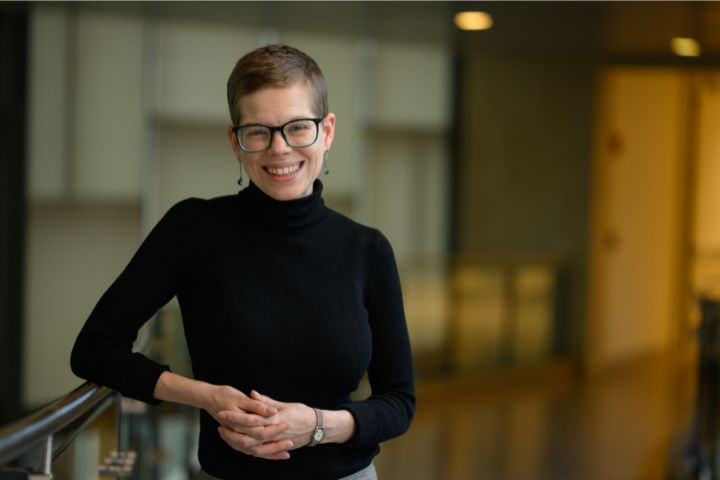Electing to vote or not

Ariel White, Assistant Professor of Political Science
Stuart Darsch/MIT Political Science
This election season, both presidential candidates are vying for the Latino vote. Just how many votes that represents will depend on how many Latinos register and how many go to the polls. And those numbers will depend in part on the information they receive.
In a paper published last year in the American Political Science Review, Ariel White and co-authors showed that election administrators responsible for providing information to potential voters are less likely to respond to email inquiries from Latino-sounding names than they are to non-Latino, white-sounding ones—and when they do respond, their answers are of lower quality. The paper, titled "What Do I Need to Vote? Bureaucratic Discretion and Discrimination by Local Election Officials," recently received the Heinz Eulau Award for best article of the year published in the APSR, the political science discipline’s flagship journal. Reviewers noted the paper’s “far reaching implications for the study of democracy and equity.”
Far reaching indeed, according to White, especially during what is already a confounding election season.
“This has been on my mind as we go into the first presidential election since the [2013 Shelby v. Holder] decision,” she says. “We’re seeing voter ID laws pass into and out of existence as the various court decisions come down. There’s a lot of room for people to be confused about their eligibility. We might see real effects on turnout, as certain people don’t know where to get information or are unable to get it and potentially don’t vote because of that.”
White—the newest faculty member of the Department of Political Science—studies the effects of punitive government policies on voter behavior as well. This work, too, has implications for the make-up of America’s voting public.
She found, for example, that the implementation of immigration enforcement programs such as Secure Communities, designed to identify deportable immigrants in US jails, actually mobilizes Latino voters. Being sent to jail for a minor offense, on the other hand, can have the opposite effect: White found that even serving a short jail sentence makes black and Latino individuals less likely to vote in the following election. She found no evidence of demobilization among whites.
“Given that who gets sentenced to jail is disproportionate by race, this could have real effects on what the electorate looks like,” she says.
There are potential policy solutions for these problems. “Based on our finding that places covered by the preclearance section of the Voting Rights Act didn't discriminate, we concluded that monitoring makes elections officials less likely to do so. So if Congress were to put preclearance back into the VRA, it would help reduce the discriminatory practices we describe in our paper.”
When it comes to voter turnout after punitive experiences with government, “it’s harder to pin down what the mechanisms are,” she explains. “I’ve been studying misdemeanors, which are the easiest thing to get arrested for. As police end up facing more scrutiny for whether they really need to be stopping all these individuals for minor crimes, we might just see fewer people ending up in the system.” Fewer incarcerated people could mean fewer disenfranchised citizens.
Putting people in political science
It’s no accident that White’s research seems mission-driven. She feels strongly that the human dimension of her work is as important as the scientific one. In a course she’ll teach next spring on race and politics, White says “there’s room to pull in first-person descriptions and social science on the same topics: Here is what people are saying, and here is how social science is trying to operationalize it.”
White’s interest in voting goes back to childhood: “My parents would take me to the voting booths, hold me up, and I would pull the levers.” She also traces the drive to explore the human-behavior side of it to her post-college work in a legal aid office. That experience “formed the underpinning of my focus on the punitive face of government,” she says.
“I was seeing how draining it can be to have awful experience after awful experience with a benefits offices, say, or other administrative bodies, and how that can shape people’s whole view of government—in ways that make a lot of sense. These offices felt connected in a way political scientists often don’t think about: people were having a bad experience with welfare, but it was coloring their opinion of their elected officials, and the social security office, and the local schools. That’s not an obvious connection for a political scientist who is deeply into one policy area or another.”
It was in the office of legal aid that White also developed the skills needed for dealing with people in crisis, which she still uses today. A longtime volunteer for the Boston Area Rape Crisis Center, or BARCC, she answers the hotline and supports other counselors doing the same.
These days White is finding ways to measure the spillover effects of incarceration—that is, the household-level effect on voter turnout. “Let’s say I go to jail,” she says. “It might affect whether I turn out to vote, but it also might affect my mom, or my partner, or my kids, and whether they vote. This is a bigger story than just one of individuals.”
